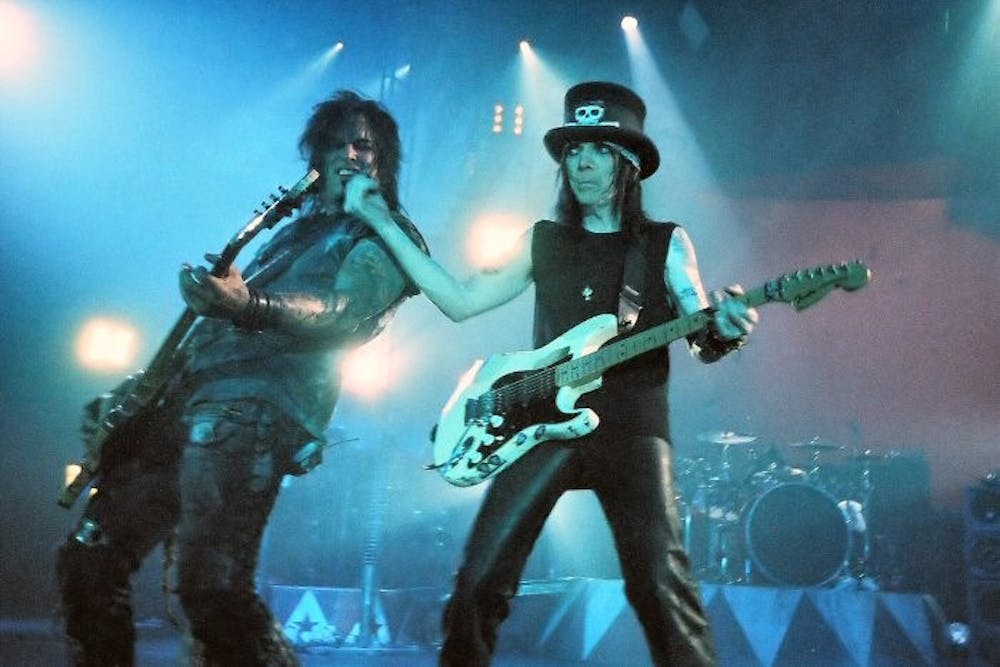“The Dirt” is everything a Mötley Crüe fan expected.
It’s just that everyone else didn’t know the tale by heart.
Sex, drugs and rock n’ roll dominate Mötley Crüe’s legacy. As the best-selling tell-all book showed, sex sells. Mӧtley Crüe detailed years of debauchery filled with even more drugs. For the avid rock fan, the story presented a worthwhile transgression into a world we’ve all heard so much about: getting rich and living through some of the craziest things that no one would believe.
The prospect of giving “The Dirt” has been kicked around for over 10 years. MTV bought the rights to the book in 2006 and early development begun. Negotiations and further development stagnated the release of the film.
Cue Netflix: a seemingly perfect fit to allow the band and director Jeff Tremaine (the “Jackass” movies and that’s about it) to tell the Crüe’s story with little to no restriction.
Only I’m not so sure “The Dirt” is better off this way.
On paper, the story seems interesting enough. Nikki Sixx, Tommy Lee, Mick Mars and Vince Neil all consumed enough drugs and alcohol to kill a small horse on a rolling basis. The makings for a classic-in-the-making film are there, only the execution falls short.
“The Dirt” excels in the same areas the book does. Retelling crazy stories ranging from Ozzy Osbourne snorting ants in a crowded hotel pool to Nikki Sixx’s infamous heroin overdose that left him legally dead. These are gems in the film that stand out, due in large part to the legendary nature of each example.
But that’s about it.
“The Dirt” aims to go the “Bohemian Rhapsody” route with an overarching injection of the bands more serious issues. Behind the glamour was a band with issues like any other, ranging from Tommy Lee’s marital turmoil to Vince Neil’s manslaughter charge and the death of his daughter. But “The Dirt” misses the mark executing these narratives. Instead, serious issues become jumbled in the mix in order to push the grandiose aspects of Mötley Crüe.
Are destroying hotel rooms and Tony Montana-esque cocaine habits entertaining to watch? Yes. But Tremaine and company seek to conflate two differing narratives.
Rapper Machine Gun Kelly, opting to continue his acting career under his legal name Colson Baker, is an unexpected highlight of “The Dirt.” Baker brings Lee’s quirks and mannerisms to life, and especially shines as a hooligan night after night.
That includes running half naked through a hotel room chased by the police.
Of all the shortcomings of “The Dirt,” musical prowess is among them. Mӧtley Crüe’s strongest creative arch –– arguably Mick Mars –– relies more on perfectly-timed one liners and anecdotes. Iwan Rheon is definitely a good fit for the role, only Tremaine does little to try to work with what he has.
Mixed in the jumble of heroin and cocaine is the cliche and factually absent reconciliation Mӧtley Crüe finds at the conclusion of “The Dirt.” Don’t get me wrong –– it’s obvious biopics sometimes necesitate playing loose with the facts in order to drive the screen adaption. At least Tremaine didn’t go the “Bohemian Rhapsody” route for this pillar of the story.
Critics have called attention to aspects of the film that push up against and defy the #MeToo era of recent years. But are you surprised? Study the subject matter of any of your favorite ‘80s hair bands and explain to me how that same notion doesn’t apply.
I have my share of qualms that span the entirety of “The Dirt.” On a surface level, the film is enjoyable at parts. Could Tremaine and Mӧtley Crüe have put forth a stronger effort? Absolutely. But that notion in itself would be so anti-Crüe it’s almost sacrilegious. This is the same band that rose to the top with song titles like “Girls Girls Girls” and “Looks that Kill.”
And they don’t care.
Brian Evans is the senior arts editor and can be reached at brian.evans@ubspectrum.com and @BrianEvansSpec.
Brian Evans is a senior English major and The Spectrum's senior arts editor.






